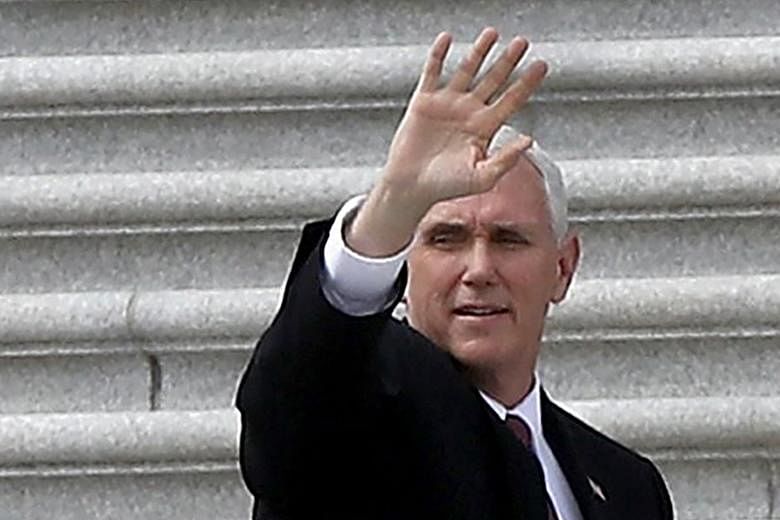US Vice-President Mike Pence's 10-day visit to the Asia-Pacific starting today is a chance for Asian leaders to better understand US policy through a measured interlocutor for President Donald Trump.
The President himself may not be travelling to Asia very often, analysts say, which makes building a relationship with the Vice-President more important.
"It will be very important for V-P Pence to win confidence in the region and familiarise himself with the region's issues so that he can effectively represent the President, if and when necessary," Ms Bonnie Glaser, a senior adviser for Asia at the Centre for Strategic and International Studies in Washington, told The Sunday Times in an e-mail.
Apart from official talks at his first stop in South Korea, Mr Pence - whose father earned a Bronze Star during the Korean War - will spend Easter Sunday with US and South Korean troops.
Subsequently, he will visit Japan, Indonesia and Australia. He will also visit Hawaii.
-
ASIA-PACIFIC STOPS
Mr Mike Pence's first official visit to the Asia-Pacific region will focus largely on trade and security, as he rubs shoulders with top political leaders and local business communities at every stop.
APRIL 16: SEOUL, SOUTH KOREA
Arriving in South Korea one day after the North showed off its new missiles and launchers with pomp and pageantry, Mr Pence is slated to discuss with Seoul Pyongyang's efforts to advance its ballistic missile and nuclear programme.
The United States Vice-President, who will also engage Acting President Hwang Kyo Ahn in a bilateral meeting, is expected to reiterate President Donald Trump's tough messages to North Korea, which have been backed by the sending of an aircraft carrier to the waters off the Korean Peninsula.
APRIL 18: TOKYO, JAPAN
Mr Pence will meet Prime Minister Shinzo Abe and lead the inaugural US-Japan Economic Dialogue with Deputy Prime Minister Taro Aso.
The US is keen to call bilateral trade negotiations as it seeks to reduce trade deficit with Japan, but the request has been turned down by the Abe administration.
Discussions at the dialogue will instead focus more on setting a "framework" for future talks, rather than on specific industry issues, a White House official said.
APRIL 20: JAKARTA, INDONESIA
Mr Pence will visit President Joko Widodo and Vice-President Jusuf Kalla, as well as the Asean secretary-general and Asean permanent representatives, as the US and the bloc mark 40 years of relations this year.
Although Mr Pence will meet business leaders in Jakarta, he is not expected to wade into the weedy details of disputes between the Indonesian government and US companies like mining giant Freeport-McMoRan .
APRIL 22: SYDNEY, AUSTRALIA
Bilateral trade and investment relations will be on the agenda when Mr Pence visits Sydney in meetings with Prime Minister Malcolm Turnbull and Foreign Affairs Minister Julie Bishop.
But the US leader is not expected to raise new objections to a controversial deal with Australia to resettle asylum-seekers currently held in Papua New Guinea in the US.
Mr Pence will also see opposition leader Bill Shorten, a firm critic of Mr Trump who famously called the US President's views "barking mad".
The trip to Tokyo, which begins on Tuesday, was initially planned to focus on US-Japan economic issues.
But security in the context of relations between Japan, South Korea and China will invariably come to the fore, said Ms Shihoko Goto, Senior Associate for North-east Asia at the Woodrow Wilson Centre's Asia Programme in Washington.
"On the economic front, unknowns still remain," she wrote in an e-mail.
"How Japan can push forward in stressing the importance of Japanese (investment in the US) and whether it will be able to win contracts in infrastructure development projects… will be of interest."
Mr Pence's visit to Indonesia from Thursday will be no less crucial both on the security and trade fronts. Indonesia is concerned about its inclusion in a list of 16 countries being investigated by the Trump administration for possible trade abuses.
Next door in Australia, there is much anticipation. Since Prime Minister Malcolm Turnbull's allegedly testy phone conversation with President Trump in February, it has not gone unnoticed that Secretaries James Mattison and Rex Tillerson have visited other US allies South Korea and Japan, but not Australia - even as their Australian counterparts have visited Washington DC.
"Canberra is seeking not just reassurance but insight into President Trump's thinking and strategy, if he has one," emeritus professor Carlyle Thayer of the Australian Defence Force Academy at the University of New South Wales wrote in an e-mail.
"In this context, Australian leaders will welcome any insights Vice-President Pence can give, including what Trump might expect Australia to contribute if regional tensions continue to rise."
The US has Free Trade Agreements (FTAs) with five of the eleven signatories to the Trans-Pacific Partnership, the agreement President Trump has pulled the US from. These include one with Australia. Australian government officials are reluctant to renegotiate the FTA, but will still seek commitment on economic and trade policies, Prof Thayer said.
He added: "The icing on the cake would be some public statement by Pence that the Trump administration will take in 'extremely heavily vetted' refugees from Nauru, thus relieving a major pressure point on Prime Minister Turnbull."
Mr Trump had complained about the asylum-seeker deal that Mr Turnbull had brokered last year with then-President Barack Obama but White House officials have said the US would honour the agreement.

